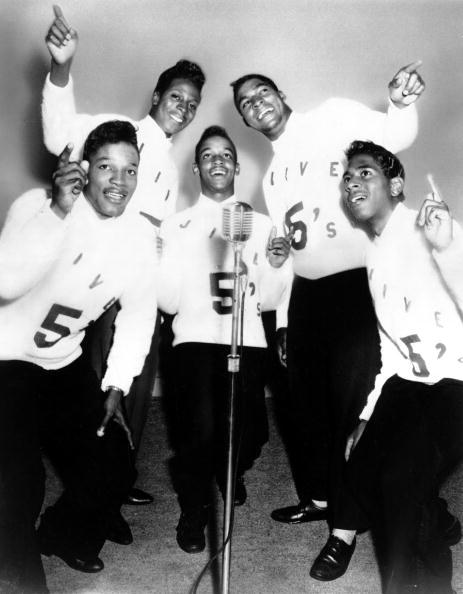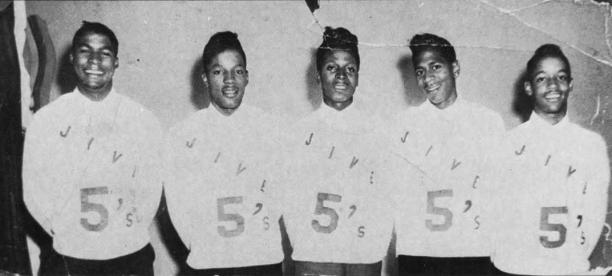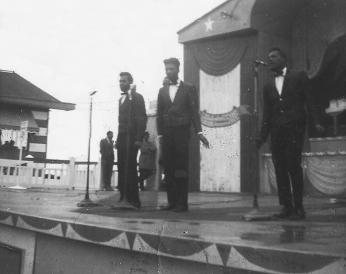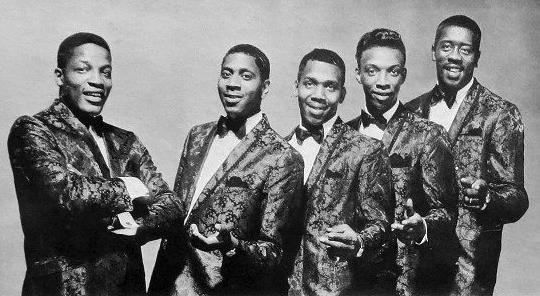
Personnel :
Eugene Pitt (Lead)
Norman Johnson (Bass)
Richard Harris (Second Tenor)
Billy Prophet (Baritone)
Jerome Hanna (First Tenor)
Discography :
The Jive Five
Biography :
Eugene Pitt hailed from Brooklyn's Bedford-Stuyvesant neighborhood, musically influenced by his father, a gospel singer, who taught Eugene and his sisters how to harmonize; they performed gospel songs in churches until about 1950, when he entered his restless teenage years. The atmosphere of Brooklyn's streets, with doo wop singers everywhere, stirred a desire for rhythm and blues stardom and by mid-decade he had joined a group called The Akrons . A little later Eugene sang with a group headed by Claude Johnson, but they separated when Johnson left for Long Island to join The Genies, the outfit that later scored a national hit with "Who's That Knocking."

In 1959 Pitt put together his own group, The Jive Five, with friends from the neighborhood. He and Jerome Hanna sang tenor, supported by Richard Harris, Thurmon "Billy" Prophet and bass singer Norman Johnson. Not much happened at first; Pitt was working as a stock clerk in a supermarket in early '61 when all five jivers auditioned for Les Cahan and Joe Rene at the Beltone Studio on Broadway in New York. Cahan, who'd been running the studio for several years, had decided to branch out with Beltone Records and made a spectacular splash shortly afterwards with Bobby Lewis's "Tossin' and Turnin'," the biggest hit of the entire year. One of the songs the Jive Five sang that day was an original ballad by Pitt and Oscar Waltzer, "My True Story," based on Eugene's own experience of losing a girlfriend to one of his (former?) pals.



The quintet followed with the low-charting "Never, Never" at the end of the year, an outstanding track regardless of its similarity to the debut single. Many of the Beltone B sides could have been hits under the right circumstances, including this 45's flip, "People From Another World," a wild slice of flying saucer paranoia. "Hully Gully Callin' Time," with the expanded label credit The Jive Five with Eugene Pitt, was the group's contribution to a current dance craze. Next came the best ballad since the initial release, "What Time Is It?" Pitt's falsetto (often used to supplement his lead vocals) is at full throttle on this track, which might have been much bigger had it been possible to turn the clock back a year or two prior to the fall of '62.

After this, Billy Prophet left to pursue a solo career and, tragically, Jerome Hanna developed walking pneumonia and passed away, leaving the group in search of replacements. Andre Coles signed on briefly. Casey Spencer joined for a longer stretch. Figuring ballads were the Five's forte, Cahan put out "These Golden Rings" late in the year and it did well, making an appearance on the R&B charts. "Rain," with its hypnotic 'drip...drop...' backing vocals by J.R. Bailey, Bobby Phillips and Charles Brooks, all former members of The Cadillacs, appeared in early 1963 as Beltone Records fell deeper into financial straits with distributor King Records. With no major hits since the Bobby Lewis and Jive Five smashes of '61, Cahan had stood by as finances gradually dwindled. The label ceased operation in early '64 but Cahan kept the recording studio going as before.The Jive Five An "extended family" of singers came and went over the next couple of decades, the one constant being lead singer Eugene Pitt. After a one-shot '64 release on the tiny Sketch label, "United" (remaking the 1957 hit by Otis Williams and his Charms), they signed with United Artists Records in 1965.
